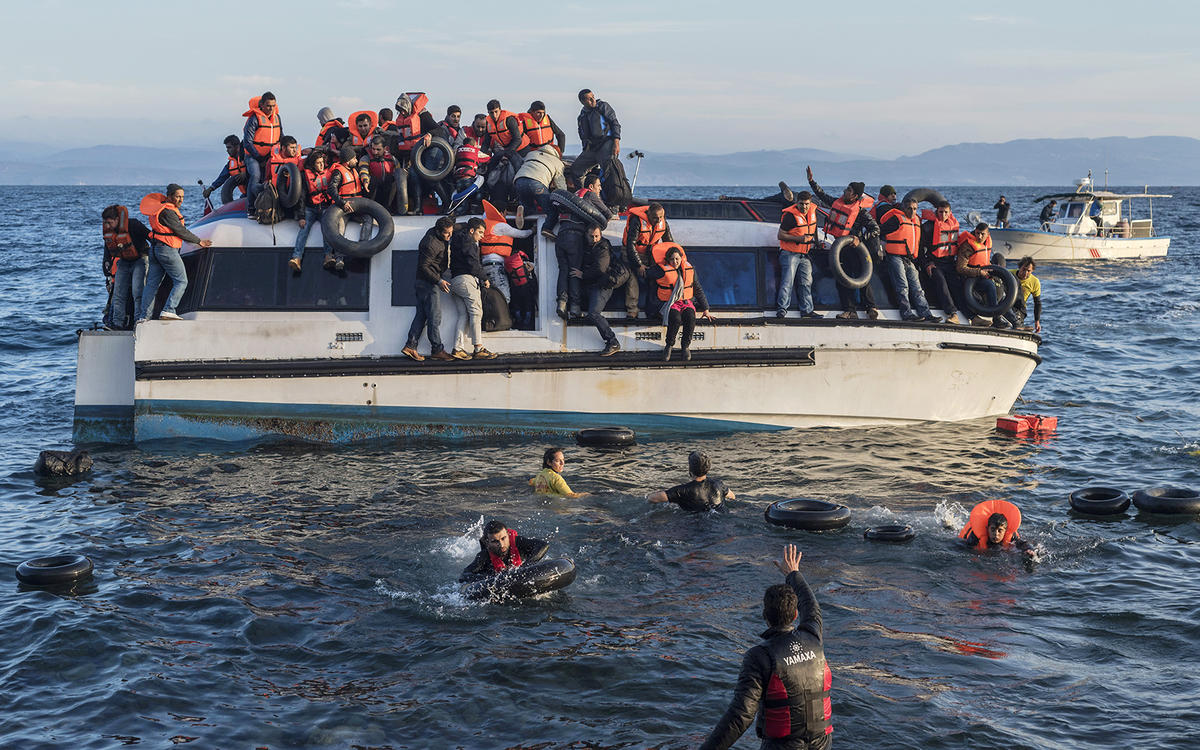The Migrant Crisis in Europe and the U.S.-E.U. Relationship
Changes in the Brussels-Washington equation may affect the European Union’s refugee resettlement efforts.
BY KATHLEEN SHEEHAN

Syrian and Iraqi refugees from Turkey arrive at the island of Lesbos off the coast of Greece in October 2015.
Wikimedia Commons / GGIA
As the European Union continues to take stock of its relationship with the new Donald J. Trump administration, the refugee and migration crisis that has overwhelmed the continent in recent years is subsiding. The annual number of individuals crossing into Europe dropped from more than a million in 2015 to about 300,000 in 2016, and stands at just over 12,000 as of February.
Despite a decrease in the number of people arriving, however, European countries must nonetheless ensure that all migrants have access to safe reception and accommodation sites while they wait for their asylum claims to be adjudicated.
To date, the United States has worked cooperatively with Europeans to deal with the crisis, and the European Union has counted on American moral and financial advocacy on behalf of refugees and migrants. Whether Washington will continue to play this role under the new administration is uncertain.
State of the Crisis
The number of refugees crossing from Turkey to Greece has dropped considerably since the wave began in 2015. According to the United Nations High Commission for Refugees, just 264 people arrived in Greece in January 2017, a fraction of the 67,000 who arrived in January 2016. The dramatic reduction is due in large measure to the deal the European Union struck with the government of Turkey in March 2016.
Under that arrangement, for every migrant Turkey accepts back from Greece, the E.U. has agreed to resettle one migrant from Turkey. The E.U. also disbursed 3 billion euros to Turkey for migrant assistance. This deal, criticized by many humanitarian organizations for threatening to forcibly return refugees to countries where they are liable to be persecuted, effectively sent a message to people fleeing the Middle East that the Turkish route to Europe was closed.
Meanwhile, the flow of migrants from Africa to Italy has continued unabated, with no end in sight. According to the UNHCR, 170,973 people made the treacherous journey from Libya to Italy in 2016, and the agency predicts another 190,000 will arrive this year.
Given the perceived success of the E.U.-Turkey deal in halting migration from that country, E.U. member-states are now looking to countries in North Africa to play a more active role in stemming the flow of people to southern Europe. At the 2017 summit, where Malta assumed the presidency of the European Union, member states proposed more training for and a greater exchange of information with the Libyan Coast Guard, as well as stepped-up intelligence sharing, to target smugglers.
Because migrants stranded in Libya are held in detention centers, the E.U. also pledged to help authorities improve conditions in such facilities—both to facilitate the process of integrating migrants into European society and to support international organizations’ efforts to assist with voluntary returns.
A Changing Trans-Atlantic Relationship
As Brussels continues to deal with this migration crisis, it is simultaneously forging a relationship with the new U.S. administration. In February E.U. High Representative Federica Mogherini visited Washington, D.C., and noted that for the first time the main focus of her visit was the bilateral relationship, rather than world crises. While speaking to the press during that trip, she commented that the E.U. was entering “a time of a more pragmatic and transactional kind of relationship with the United States.”
This cautious tone was the result of continued uncertainty over the nature of the relationship the Trump administration plans to have with Europe. In a strong reaction to remarks President Trump made during his campaign, European Council President Donald Tusk sent a letter to European leaders on Jan. 31, noting that “the change in Washington puts the European Union in a difficult situation, with the new administration seeming to put into question the last 70 years of American foreign policy.”
European leaders expressed strong opposition to Pres. Trump’s likely nominee to be ambassador to the European Union, Ted Malloch, because of his perceived hostility toward the E.U. In a January BBC interview, when asked why he wished to hold that position, Malloch responded: “I had, in a previous career, a diplomatic post where I helped to bring down the Soviet Union. So maybe there’s another union that needs taming.”
Other administration officials have been more positive about the future of the relationship. In his February visit to Brussels, Vice President Mike Pence said, “It is my privilege on behalf of Pres. Trump to express the strong commitment of the United States to continued cooperation and partnership with the European Union.”
The first question to ask in determining the impact of a changing trans-Atlantic relationship on the migration crisis is whether the programs established by the Obama administration to assist Europe in addressing the problem will continue.
However, Pierre LeCorre, an E.U. specialist at the Brookings Institution, noted that the visit did not help to restore Europe’s confidence in the relationship because “no one knows how connected Pence is to the Trump foreign policy team.”
Executive Order 13769, signed by Pres. Trump on Jan. 27, further complicated the formation of a new U.S.-E.U. relationship. The order capped the number of refugees to be resettled in the United States in 2017 at 50,000 (the previous administration had set a Fiscal Year 2017 ceiling of 110,000), suspended all refugee admissions for at least 120 days, barred the entry of Syrian refugees indefinitely and prohibited the entry of nationals from seven specified countries (Syria, Iran, Sudan, Libya, Somalia, Yemen and Iraq). European leaders did not hold back in their criticism of this action.
During her February visit to Washington, Mogherini made clear just how strongly Brussels disagreed with the executive order. “The E.U. does not believe doors are open to all,” she noted, “but also does not believe in walls or discrimination on nationality.” According to LeCorre, “The U.S. no longer has any credibility with the E.U. on migration issues.”
Following successful legal challenges to EO 13769, on March 6 the Trump administration issued a replacement, Executive Order 13780. The new E.O. also halted the admission of refugees for 120 days (from the same list of countries, minus Iraq). However, on March 15 the United States District Court for the District of Hawaii issued a nationwide injunction prohibiting the Department of State from enforcing or implementing Sections 2 and 6 of this executive order. Section 6 includes certain provisions relating to refugee admissions. Consequently, the Department of State has continued to admit refugees through the U.S. Refugee Admission Program.
Looking Ahead
The first question to ask in determining the impact of a changing trans-Atlantic relationship on the migration crisis is whether the programs established by the Obama administration to assist Europe in addressing the problem will continue. Such efforts included pledges at the 2016 Leaders Summit on Refugees of $50 million for the Global Crisis Response Platform, as well as $11 million for the Emerging Resettlement Country Joint Support Mechanism—an effort to provide financial and technical support to nations trying to establish or expand their refugee resettlement programs.
In 2015 then-Secretary of State John Kerry established a working group, composed of representatives from 26 State Department offices and six federal agencies, to coordinate the American response to the migration crisis. The working group operated under three guiding principles: fill gaps in human assistance on the ground; strengthen cooperation on border security and migrant vetting; and exchange best practices on resettlement. According to sources in the Bureau of Population, Refugees and Migration, the working groups are still standing, but they are working on an as-needed basis.
The Trump administration’s proposed budget for FY 2018 included a 29-percent reduction for the Department of State. When asked how the proposed budget would affect U.S. assistance for the migration crisis in Europe, a spokesperson for PRM was not able to provide information beyond a March 17 memo from Office of Management and Budget Director Mick Mulvaney, which stated: “Until OMB releases the full FY 2018 budget, all public comments of any sort should be limited to the information contained in the budget blueprint.”
If Europeans see the U.S. leadership role on migration fading, will they pick up the slack? When High Representative Federica Mogherini visited Washington, she was asked this question directly. She replied that the E.U. “is ready.” Despite this assertion, it’s hard to know what will happen to cooperation among European countries if they believe Washington has washed its hands of the refugee crisis.
After the Trump administration announced the details of the initial executive order halting arrivals, thousands of people in Europe protested via social media and in demonstrations. According to an opinion piece published by the European Council on Foreign Relations in February, “Europe must not allow itself to be divided and conquered. … Instead, the E.U. must speak with one voice to defend international agreements and basic human rights, including the rights of refugees.”
With national elections coming up in France, Germany and Italy, political parties expressing anti-immigrant sentiments are speaking more loudly. (The ruling coalition in the Netherlands held onto power in March elections, but at the price of tacking sharply to the right on immigration.) Despite the E.U.’s criticism of the proposed United States travel ban, many center-right politicians in Europe praised it. This is already having a negative impact on the relocation of refugees from Greece and Italy to other European countries. While their northern neighbors pledged to relocate 106,000 refugees by September 2017, only 11,000 have actually been moved.
Europe expects that the United States will be less engaged on the migration crisis going forward. As the E.U. stops looking to the U.S. for support on the migration crisis, will it also look away from the United States for cooperation on other trans-Atlantic issues, such as trade, security and protection of human rights? During a March 1 Council on Foreign Relations podcast assessing the state of the U.S.-E.U. relationship, Senior Fellow Charlie Kupchan stated: “Europe is the anchor of our global policy.” Time will tell whether this foundation remains strong.





